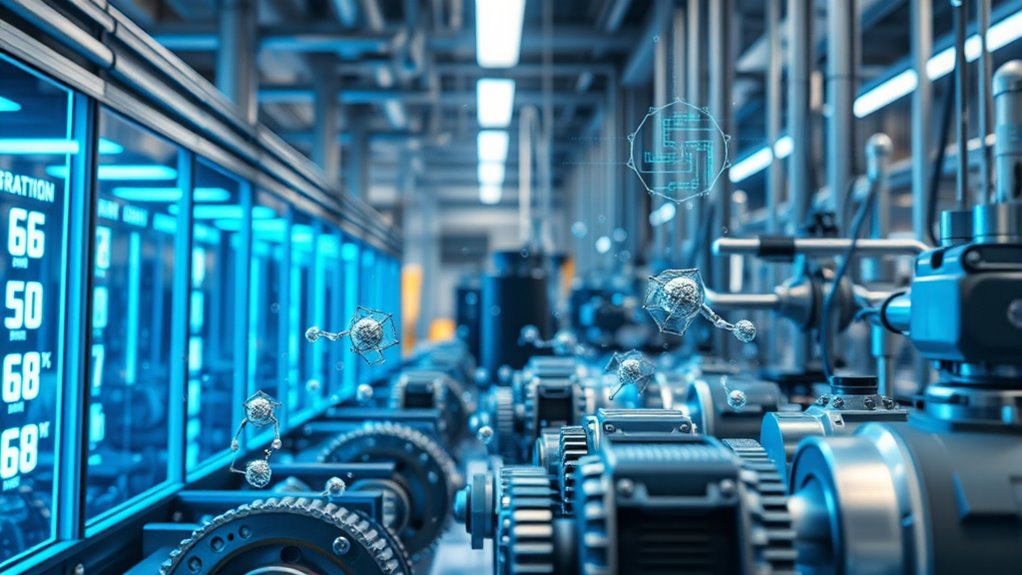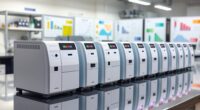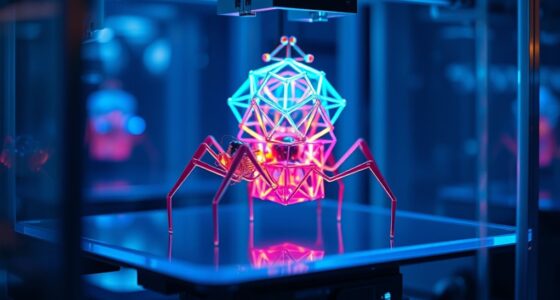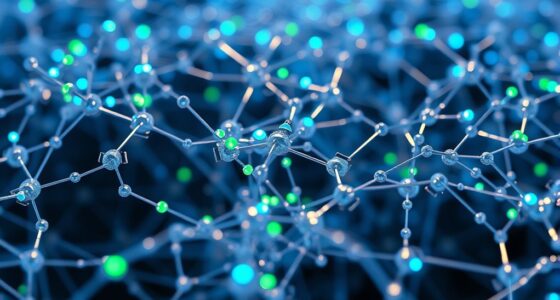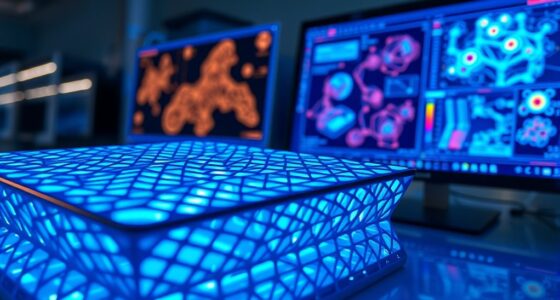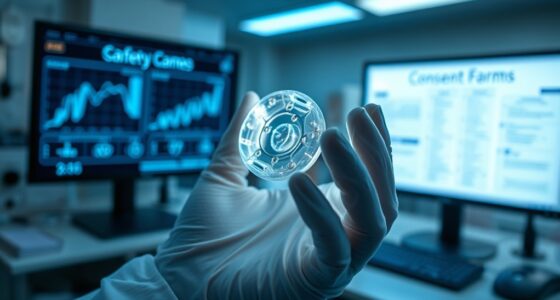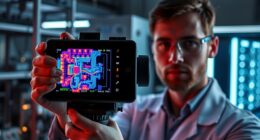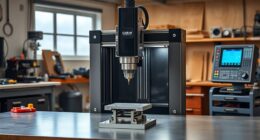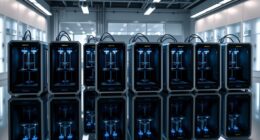By 2030, nanomachines could revolutionize industries by enabling precise healthcare treatments at the cellular level, reducing side effects, and enhancing personalized medicine. They’ll accelerate manufacturing with atomic-level assembly, boosting efficiency and enabling rapid customization. In energy, they’ll create lightweight solar cells and high-density batteries for cleaner power. Environmental cleanup will become more effective with nanomachines detecting and neutralizing pollutants. To explore how these advancements could reshape your world, keep exploring what’s possible.
Key Takeaways
- Enable atomic-level manufacturing for stronger, lighter, and highly customized products with minimal waste.
- Accelerate production speed and precision through real-time error correction and automation.
- Support seamless, on-demand assembly and rapid design modifications without halting manufacturing processes.
- Reduce energy consumption and waste by developing advanced nanostructured materials and efficient energy systems.
- Enhance environmental cleanup and monitoring, allowing precise detection and removal of pollutants at the molecular level.
Revolutionizing Healthcare With Nanomachines
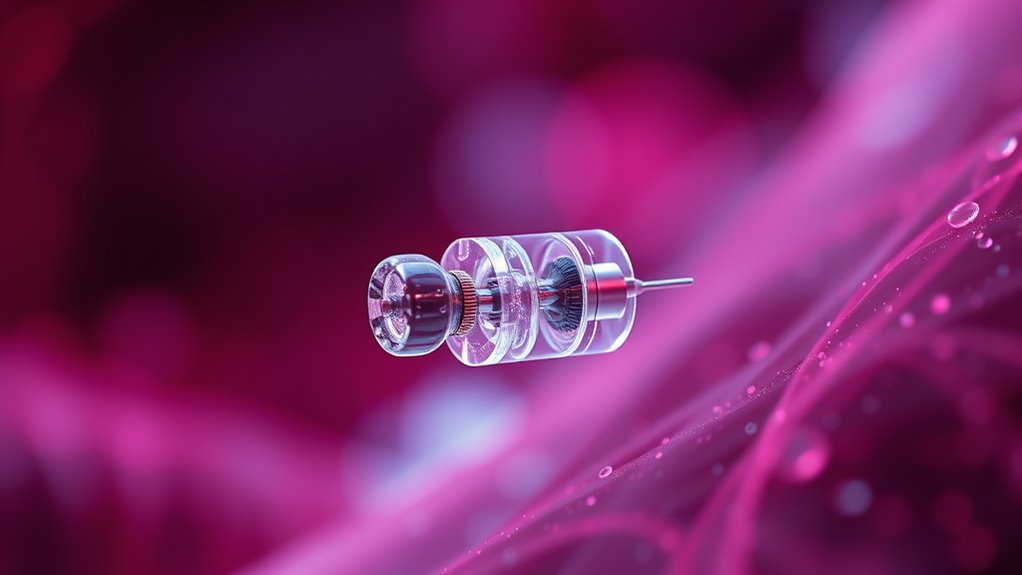
Nanomachines are poised to revolutionize healthcare by enabling precise, targeted treatments at the cellular level. You’ll see treatments that directly address affected cells, reducing side effects and increasing effectiveness. Imagine nanomachines steering your bloodstream, seeking out cancer cells or infected tissues with pinpoint accuracy. They can deliver drugs exactly where needed, avoiding healthy cells and minimizing damage. This level of precision means faster recovery times and improved patient outcomes. Additionally, nanomachines could repair damaged tissues or remove harmful buildup inside your body, acting like microscopic surgeons. As these devices become more sophisticated, they’ll transform how illnesses are diagnosed and treated, making healthcare more personalized, less invasive, and highly efficient. This innovation promises a future where diseases are addressed at their very source. Embrace Calm and Clarity With Stoic Wisdom
Transforming Manufacturing Processes

As industries adopt nanomachines, manufacturing processes become faster, more precise, and highly adaptable. You’ll notice production lines that can self-correct errors in real-time, reducing waste and increasing efficiency. Nanomachines enable the assembly of complex components at the atomic level, allowing for stronger, lighter, and more durable products. Customization becomes seamless, with rapid adjustments to design and materials without halting production. You’ll also see increased automation, where nanomachines handle delicate tasks that traditional machinery struggles with, all while maintaining consistent quality. This shift minimizes downtime and shortens lead times, making manufacturing more responsive to market demands. Additionally, advancements in juice extraction techniques exemplify how nanotechnology can optimize processes, leading to higher yields and better nutrient retention in food production. Ultimately, your industry will operate with unprecedented agility, reducing costs and delivering higher-quality products faster than ever before.
Advancing Energy Production and Storage
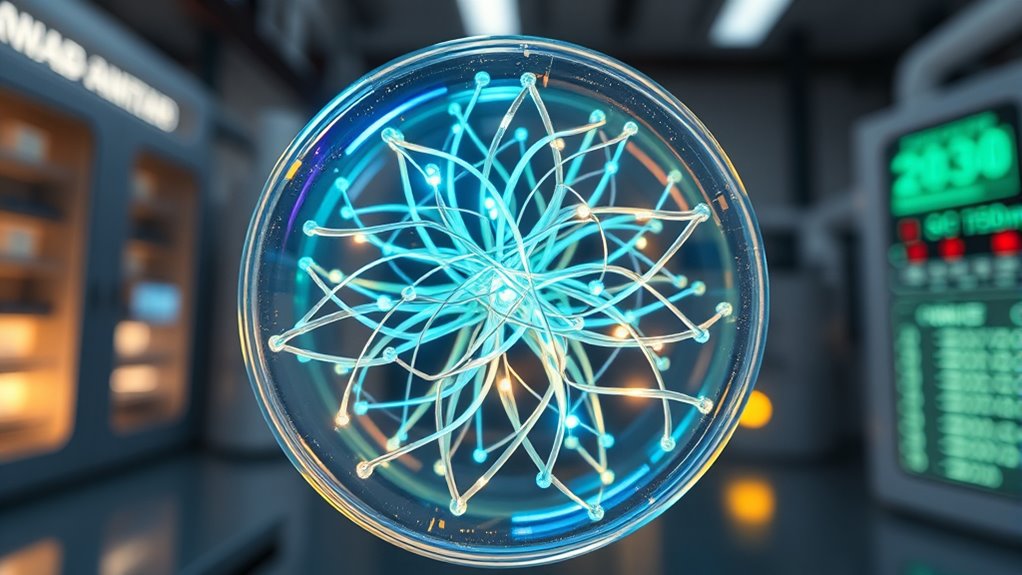
The precision and efficiency improvements driven by nanomachines in manufacturing are now opening new possibilities in energy production and storage. With nanomachines, you can develop highly efficient, lightweight solar cells that maximize energy capture while reducing material costs. They also enable the creation of advanced batteries with greater energy density, faster charging times, and longer lifespans, making renewable energy more practical. Nanomachines facilitate the fabrication of molecular-scale energy converters and storage units, improving overall system performance. You can also engineer nanostructured materials that enhance thermal management in energy systems, reducing waste. These innovations allow for more decentralized and flexible energy grids, empowering you to generate, store, and distribute power more effectively, ultimately accelerating the transition to sustainable energy solutions. Additionally, personal development techniques like visualization and goal setting can help you stay motivated to adopt and support these emerging technologies.
Environmental Monitoring and Cleanup

Thanks to their remarkable precision and responsiveness, nanomachines are revolutionizing environmental monitoring and cleanup efforts. You can deploy these tiny devices to detect pollutants at molecular levels, offering real-time data that was previously impossible. They can identify hazardous chemicals in water, air, and soil quickly and accurately. During cleanup, nanomachines actively seek out contaminants, breaking them down into harmless substances or removing them entirely. This targeted approach minimizes environmental disruption and enhances efficiency. Their mobility allows them to navigate complex ecosystems, reaching areas traditional methods can’t access. As a result, nanomachines enable faster response times, reduce cleanup costs, and improve overall environmental health. By harnessing these innovations, industries and governments can better protect ecosystems and public health for a sustainable future.
Ethical Considerations and Future Challenges
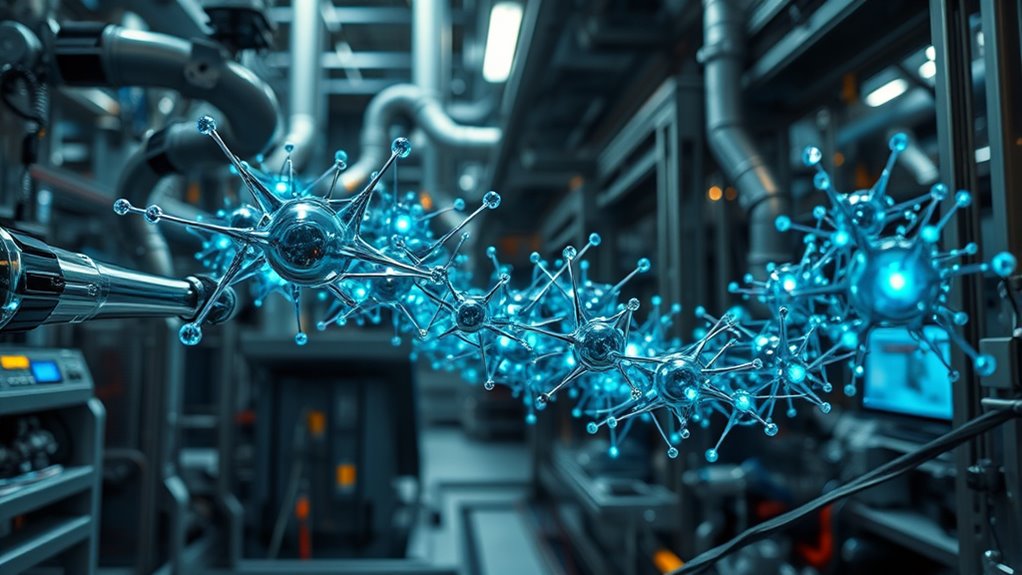
While nanomachines offer incredible potential for industry and environmental health, they also raise significant ethical concerns and future challenges that need careful consideration. You must think about safety, privacy, and control, as these tiny devices could be misused or malfunction, causing unintended harm. Regulatory frameworks are still evolving, so establishing standards for development and deployment is vital. You also face questions about consent, especially in medical or environmental applications. Public trust hinges on transparency and responsible use. Additionally, the environmental impact of manufacturing and disposing of nanomachines remains uncertain. Balancing innovation with ethical responsibility is fundamental to prevent misuse, guarantee safety, and foster societal acceptance as these technologies become more integrated into everyday life. Furthermore, understanding the self-awareness of nanomachines and their potential for autonomous decision-making is crucial for ensuring safe integration into human environments.
Frequently Asked Questions
How Will Nanomachines Impact Global Economic Inequality?
Nanomachines could either reduce or widen global economic inequality. If you leverage nanotech to improve healthcare, manufacturing, and resource management, you could boost productivity and access for underserved communities. However, if only wealthy nations or corporations control this technology, inequality might grow as others fall behind. You need inclusive policies and shared innovation to guarantee nanomachines benefit everyone, not just the privileged few.
What Regulatory Frameworks Are Needed for Nanomachine Deployment?
You need clear, adaptable regulatory frameworks that address safety, ethical concerns, and environmental impacts. Governments should establish standards for manufacturing, testing, and deploying nanomachines, ensuring transparency and accountability. International cooperation is essential to prevent misuse and promote responsible innovation. By involving scientists, policymakers, and industry leaders, you can create regulations that foster growth while safeguarding public health and security in the rapidly evolving nanotechnology landscape.
Could Nanomachines Be Weaponized or Misused Intentionally?
Nanomachines could be weaponized or misused intentionally, posing an unprecedented threat that could rival catastrophic disasters. You might worry about malicious actors releasing tiny, unstoppable agents capable of wreaking havoc on a scale previously unimaginable. Without strict international regulations and security measures, these powerful tools could fall into the wrong hands, leading to devastating consequences. Vigilance, oversight, and responsible development are essential to prevent such dangerous misuse.
How Will Nanomachines Affect Privacy and Personal Data Security?
Nanomachines could profoundly impact your privacy and data security by enabling precise monitoring and data collection at a microscopic level. You might find your personal information vulnerable if these devices are exploited or hacked. It’s essential to stay informed about emerging security measures and advocate for strict regulations to protect your data. As technology advances, remaining vigilant ensures your privacy isn’t compromised by malicious uses of nanomachines.
What Are the Long-Term Environmental Implications of Nanomachine Waste?
You might worry that nanomachine waste could accumulate in ecosystems, potentially harming wildlife and contaminating water sources. Over time, if not properly managed, these tiny devices could persist or release toxic substances, disrupting natural processes. To prevent this, you’ll need strict regulations and innovative disposal methods. By staying informed and advocating for responsible usage, you can help minimize environmental risks associated with nanomachine waste in the long run.
Conclusion
So, by 2030, you’ll probably be marveling at nanomachines quietly fixing your body, building your car, or cleaning up pollution—all while you relax. Who knew tiny robots could become the ultimate multitaskers? Just remember, as they take over more tasks, you might need to brush up on your sci-fi knowledge. But hey, at least you won’t have to lift a finger—unless, of course, you want to. Welcome to the tiny-powered future!
